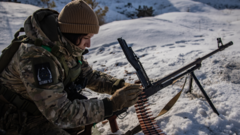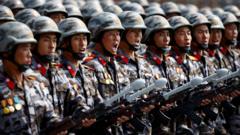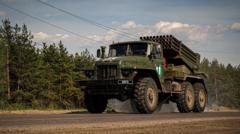Following humanitarian considerations, Russian President Putin has announced a three-day ceasefire in Ukraine from May 8 to 11, coinciding with events celebrating the end of World War Two. As Ukraine has yet to respond, the truce adds to the series of failed previous ceasefire attempts, further fueling speculation on future peace talks amidst the ongoing conflict.**
**Putin Declares Three-Day Ceasefire in Ukraine Amid Victory Celebrations**

**Putin Declares Three-Day Ceasefire in Ukraine Amid Victory Celebrations**
**Temporary truce set to align with commemorative events, raising hopes for peace amidst ongoing conflict.**
In a significant announcement, Russian President Vladimir Putin has declared a temporary ceasefire in the ongoing war in Ukraine. This ceasefire is set to take place from the morning of May 8 until May 11, strategically aligning with the commemorations of Victory Day, which marks the end of World War Two. The Kremlin's statement cited "humanitarian considerations" as the basis for Putin's declaration.
Ukraine has not yet provided an official reaction to the announcement. The Kremlin's translation suggested that Russia expects Ukraine to reciprocate this gesture of goodwill. Furthermore, it asserted that any violations of the ceasefire by Ukrainian forces would prompt an "adequate and effective response" from the Russian Armed Forces.
Historically, ceasefires in the Ukrainian conflict have been met with skepticism. A previous 30-hour truce during Easter faced numerous accusations of violations from both sides, albeit resulting in a temporary decrease in hostilities. Over 20 ceasefire attempts have been recorded since the beginning of the conflict, many failing within minutes of their initiation.
The announcement comes at a critical juncture, as the United States has been actively pursuing a resolution to the conflict. The US administration, under President Biden and formerly Donald Trump, has emphasized the need for progress in the ongoing peace talks, urging both nations to seek a diplomatic resolution.
As of now, Russia's military operations continue since the full-scale invasion commenced on February 24, 2022, with Russian forces occupying about 20% of Ukraine and causing extensive loss of life on all sides, estimating casualties in the hundreds of thousands.
The world watches to see if this latest ceasefire will yield any significant outcomes or just become another footnote in the history of the prolonged conflict.
Ukraine has not yet provided an official reaction to the announcement. The Kremlin's translation suggested that Russia expects Ukraine to reciprocate this gesture of goodwill. Furthermore, it asserted that any violations of the ceasefire by Ukrainian forces would prompt an "adequate and effective response" from the Russian Armed Forces.
Historically, ceasefires in the Ukrainian conflict have been met with skepticism. A previous 30-hour truce during Easter faced numerous accusations of violations from both sides, albeit resulting in a temporary decrease in hostilities. Over 20 ceasefire attempts have been recorded since the beginning of the conflict, many failing within minutes of their initiation.
The announcement comes at a critical juncture, as the United States has been actively pursuing a resolution to the conflict. The US administration, under President Biden and formerly Donald Trump, has emphasized the need for progress in the ongoing peace talks, urging both nations to seek a diplomatic resolution.
As of now, Russia's military operations continue since the full-scale invasion commenced on February 24, 2022, with Russian forces occupying about 20% of Ukraine and causing extensive loss of life on all sides, estimating casualties in the hundreds of thousands.
The world watches to see if this latest ceasefire will yield any significant outcomes or just become another footnote in the history of the prolonged conflict.



















